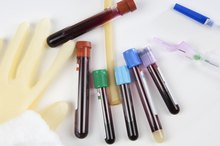Lung Cancer & Low Potassium
According to the Centers for Disease Control and Prevention, more than 200,000 people in the United States were diagnosed with lung cancer in 2007 and more than158,000 people died from the disease that year. Lung cancer not only affects the function of the lungs, but it can disrupt the balance of electrolytes such as potassium. Certain cancers of the lung can produce hormones, which can cause an increase in potassium excretion.
Types of Lung Cancers
Lung cancers can be separated into two groups: cancers that originate in the lungs and cancers that metastasize, or spread, to the lungs. The four major cancers that originate in lungs include squamous cell lung cancer, small cell lung cancer, adenocarcinoma of lungs and large cell lung cancer; these cancers originate from the main branches of the airways. As lung cancers get bigger, they cause problems by obstructing the airways. Lung cancers can cause problems outside the lungs, for example, small-cell lung cancer can produce ACTH, a hormone that stimulates the release of aldosterone -- a steroid hormone -- from the adrenal glands.
- Lung cancers can be separated into two groups: cancers that originate in the lungs and cancers that metastasize, or spread, to the lungs.
- The four major cancers that originate in lungs include squamous cell lung cancer, small cell lung cancer, adenocarcinoma of lungs and large cell lung cancer; these cancers originate from the main branches of the airways.
ACTH, Aldosterone and Balance of Potassium
Low Potassium and Abdominal Pain
Learn More
In normal conditions, potassium levels are maintained by the adrenal glands, which produce aldosterone, and the pituitary gland, which produces ACTH. When blood potassium is elevated, the pituitary gland releases ACTH, which causes the adrenal glands to release aldosterone. The release of aldosterone results in the increased excretion of potassium into the urine. Aldosterone secretion decreases when blood potassium level is below normal. Small-cell lung cancer releases higher than normal levels of ACTH, which interferes with the body's ability to regulate potassium due to increased action of aldosterone in the kidneys.
- In normal conditions, potassium levels are maintained by the adrenal glands, which produce aldosterone, and the pituitary gland, which produces ACTH.
- Small-cell lung cancer releases higher than normal levels of ACTH, which interferes with the body's ability to regulate potassium due to increased action of aldosterone in the kidneys.
Symptoms of Low Blood Potassium
Potassium is needed for the adequate functioning of the heart and nerves. When potassium is low, organs most dependent on potassium become dysfunctional. Arrhythmias, or irregular heart contractions, are the most worrisome complications associated with low blood potassium, because it can result in low blood pressure, poor circulation of blood and inadequate oxygen delivery to organs of the body. Hypokalemia, or low blood potassium, can also cause weakness of muscles in the arms and legs, tiredness and constipation. Tiredness can also be attributed to the presence of cancer.
- Potassium is needed for the adequate functioning of the heart and nerves.
- Arrhythmias, or irregular heart contractions, are the most worrisome complications associated with low blood potassium, because it can result in low blood pressure, poor circulation of blood and inadequate oxygen delivery to organs of the body.
Management of Low Blood Potassium
Low Potassium Levels & Shortness of Breath
Learn More
Before treating a person with hypokalemia, the underlying cause for hypokalemia must be addressed. In a person with lung cancer-related hypokalemia the cancer must be initially treated or controlled before pursuing other methods for correcting hypokalemia. Usually, when lung cancer is adequately treated, blood potassium levels return to normal. If blood potassium remains low, the cause is likely temporary but treatment must given to avert complications associated with low blood potassium. According to "Davidson's Principles & Practice of Medicine," replacement of potassium is usually achieved with oral ingestion of slow-release potassium chloride, or KCl, tablets. Severe cases of hypokalemia are treated with the infusion of KCl into a large vein.
- Before treating a person with hypokalemia, the underlying cause for hypokalemia must be addressed.
- In a person with lung cancer-related hypokalemia the cancer must be initially treated or controlled before pursuing other methods for correcting hypokalemia.
Related Articles
References
- Centers for Disease Control and Prevention: Lung Cancer Statistics
- "Davidson's Principles & Practice of Medicine; Nicholas A. Boon; 2006
- Castillo JP. Mechanism of potassium ion uptake by the Na(+)/K(+)-ATPase.Nat Commun. 2015 Jul 24;6:7622. doi: 10.1038/ncomms8622.
- Cheungpasitporn W, et al. Pathophysiology of vomiting-induced hypokalemia and diagnostic approach.Am J Emerg Med. 2012 Feb;30(2):384. doi: 10.1016/j.ajem.2011.10.005. Epub 2011 Dec 12.
- Liamis G. Diabetes mellitus and electrolyte disorders.World J Clin Cases. 2014 Oct 16; 2(10): 488–496. Published online 2014 Oct 16. doi: 10.12998/wjcc.v2.i10.488
- Sebastian A. Renal potassium wasting in renal tubular acidosis (RTA). Its occurrence in types 1 and 2 RTA despite sustained correction of systemic acidosis. J Clin Invest. 1971 Mar; 50(3): 667–678.
Writer Bio
Chizorom Ebisike is a physician who has worked in both clinical research and medical writing since 2009. She has published articles on the respiratory system and nutrition. She has earned a Doctor of Medicine from University of Medicine and a Bachelor of Arts in nutritional sciences from Rutgers University.








